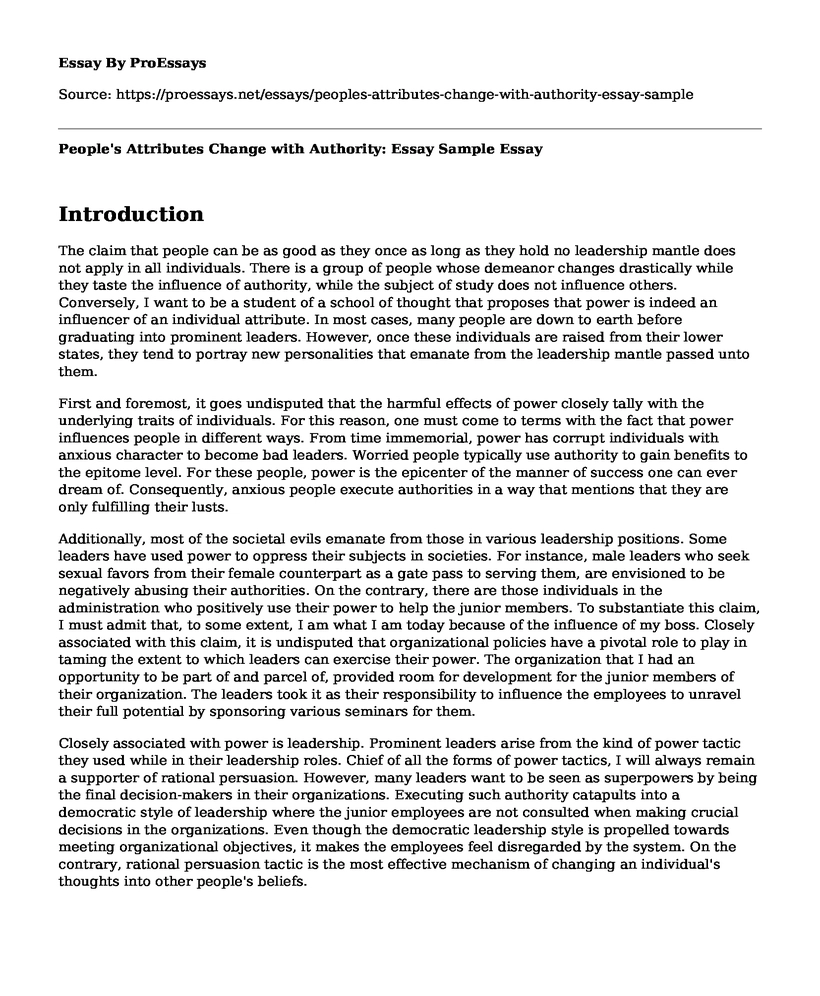Introduction
The claim that people can be as good as they once as long as they hold no leadership mantle does not apply in all individuals. There is a group of people whose demeanor changes drastically while they taste the influence of authority, while the subject of study does not influence others. Conversely, I want to be a student of a school of thought that proposes that power is indeed an influencer of an individual attribute. In most cases, many people are down to earth before graduating into prominent leaders. However, once these individuals are raised from their lower states, they tend to portray new personalities that emanate from the leadership mantle passed unto them.
First and foremost, it goes undisputed that the harmful effects of power closely tally with the underlying traits of individuals. For this reason, one must come to terms with the fact that power influences people in different ways. From time immemorial, power has corrupt individuals with anxious character to become bad leaders. Worried people typically use authority to gain benefits to the epitome level. For these people, power is the epicenter of the manner of success one can ever dream of. Consequently, anxious people execute authorities in a way that mentions that they are only fulfilling their lusts.
Additionally, most of the societal evils emanate from those in various leadership positions. Some leaders have used power to oppress their subjects in societies. For instance, male leaders who seek sexual favors from their female counterpart as a gate pass to serving them, are envisioned to be negatively abusing their authorities. On the contrary, there are those individuals in the administration who positively use their power to help the junior members. To substantiate this claim, I must admit that, to some extent, I am what I am today because of the influence of my boss. Closely associated with this claim, it is undisputed that organizational policies have a pivotal role to play in taming the extent to which leaders can exercise their power. The organization that I had an opportunity to be part of and parcel of, provided room for development for the junior members of their organization. The leaders took it as their responsibility to influence the employees to unravel their full potential by sponsoring various seminars for them.
Closely associated with power is leadership. Prominent leaders arise from the kind of power tactic they used while in their leadership roles. Chief of all the forms of power tactics, I will always remain a supporter of rational persuasion. However, many leaders want to be seen as superpowers by being the final decision-makers in their organizations. Executing such authority catapults into a democratic style of leadership where the junior employees are not consulted when making crucial decisions in the organizations. Even though the democratic leadership style is propelled towards meeting organizational objectives, it makes the employees feel disregarded by the system. On the contrary, rational persuasion tactic is the most effective mechanism of changing an individual's thoughts into other people's beliefs.
Conclusion
I prefer this form of power because it employs leadership free from all sorts of threats and power misuse. I use a type of power tactic because it incorporates teamwork in organizations. The junior members of an organization are considered insignificant decision making, and this facilitates the spirit of cooperation towards arriving at organizational long term objectives. On the other hand, I don't prefer a power tactic that involves a lot of pressure on the subordinate staff to arrive at the desired goals. My boss always synchronized both cohesion and liberty on us to come up with his desired objectives. However, too much pressure in workplaces makes working boring to the employees, whereas a rational persuasion creates an ambiance of peace for effective working.
Cite this page
People's Attributes Change with Authority: Essay Sample. (2023, Apr 10). Retrieved from https://proessays.net/essays/peoples-attributes-change-with-authority-essay-sample
If you are the original author of this essay and no longer wish to have it published on the ProEssays website, please click below to request its removal:
- Essay Sample on Management Information Systems (MIS)
- Paper Example on Thriving on Checklists: Balancing Critical Thinking and Creativity
- Research Proposal on Strategic Planning, Innovation & Change: Keys to Business Success
- Gaining a Competitive Advantage: How Businesses Make Money Selling Goods and Services - Essay Sample
- Essay Example on Elderly Fire Risk Reduction: Identifying & Prioritizing Risks
- Essay Example on Survival in a Changing World: The Power of an Effective Strategic Plan
- Essay Sample on Invictus: Uniting a Nation Through Leadership and Equality







